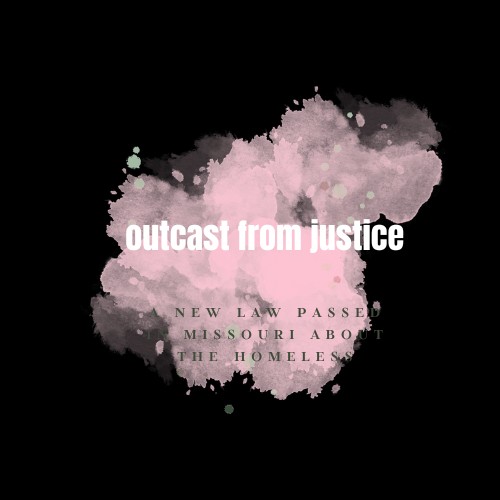Outcast From Justice
A new law touching on the homeless has been passed in Missouri

Homelessness is an issue that is well known. According to endhomelessness.org, in 2020, 2 percent of the whole population was homeless. Seventy percent of those people were individuals, the rest being families. The main reasons for this homelessness is lack of affordable housing, unemployment, poverty, and low wages. A person who is homeless is also less likely to get a good job, or a job at all, so it’s very difficult for someone who is homeless to get back on their feet and have a good, steady income.
In Missouri, there are around 6,527 homeless people. This is 10.6 people out of every 10,000. The areas with the highest are St. Louis City, Kansas city, Independence, St. Joseph, and Springfield. While Missouri is not the state with the highest number of homeless people, that being New York, with around 92,000 people, which is almost 50 percent of their population as of 2019 according to The Center Square, we still have a number of homeless people, and this will have an effect on everything, with St. Louis being as large of a city as it is.
On Jan. 1, 2023, the law of homeless being illegal was put into action. It stated that if a person was found sleeping on any public property, they would be sentenced to jail and charged $750. This law was passed without any ways to help or support those threatened by it only tearing more away from them and making their lives harder. Overall the law is very controversial at minimum, and has many parts of it that contradict with each other, starting with the $750 charge. This law is supposed to help the homeless, according to Representative Bruce DeGroot, but the logic of it doesn’t quite add up, and almost contradicts itself.
DeGroot has said that the law is not supposed to criminalize the homeless, and that the bill is in no way perfect, but nothing else has done anything to help the homeless. Coming from that point, he is correct: none of the other laws attempting to stop homelessness have ever worked well. It’s an issue that keeps happening, and this law likely won’t make much of a difference.
According to pitinosheter.org, homeless people are most commonly found in storage units, unless they are able to afford motels or cars. They also take shelter in tents, parks, or on the streets. Most all of these are illegal though, both in and outside of Missouri. If someone were to live in a car, they would have to be constantly moving around, hoping to not get caught, and this would eventually lead to a dead end with gas prices. Parks and streets are something temporary, and something that has to be carefully moved around for various reasons– all of which have to do not only with the laws, but also with society and how they might react to a homeless person in a park, seeing how people already react negatively whenever they see someone asking for money at stoplights.
A majority of society’s perspective towards homeless people is another aspect of what makes it so hard for them to get back on their feet. These people who have nothing are being treated like nothing, and it just causes a ripple effect of the person struggling even more than they were before. Many people do this because there’s a stigma about homeless people being addicted to drugs, but there’s been proof that not all homeless people are homeless because of drug abuse or want.
When it comes to children, they are often found in homeless shelters, or supported by schools by the McKinney Vento Homeless Assistance Act- a federal law created to support the enrollment and education of homeless students. This helps them from Kindergarten to their senior year of high school, but after that, it doesn’t protect them, since they are legally adults.
Data from a Google Form survey shows that 12 percent of respondents knew about the law, but only one of these votes was from someone in Missouri. While 88 percent of people didn’t know about the law, 92 percent of those people were not from Missouri.
Many different sources say very different things about the law, and it’s unclear whether this law has done any good or bad yet.


